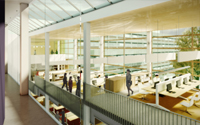New building for healthy ageing research facilities

On Wednesday 17 March, Prof. S. Poppema (President of the Board of the University) and H. Dedden (CEO of Friso Bouwgroup) signed the contract for the construction of the new ERIBA research building on the site of the University Medical Center Groningen (UMCG). The ERIBA building will accommodate medical and biological researchers working to expand our knowledge of healthy ageing.
ERIBA (European Research Institute on the Biology of Ageing) is a research institute where top-class scientists and their research groups try to find answers to fundamental questions regarding the ageing process and associated pathologies. The research is conducted at the cellular level and uses model organisms such as worms and fruit flies. The research focuses on the mechanisms underlying diseases such as Alzheimer’s and Parkinson’s disease but also on the basic processes of tumour growth and diabetes mellitus.
In addition to laboratories and offices, the ERIBA building will include a large number of state-of-the-art research facilities. ERIBA researchers employ techniques developed in genome and protein research, microscopy, bioinformatics and cell isolation.
The new Systems Biology Centre, for which the UMCG and University of Groningen recently received an NWO grant of EUR 4 million, will also be housed here. Because of its transparent construction, ERIBA offers excellent opportunities for interaction between scientists working in the various disciplines and should thus prove to be a fertile breeding ground for scientific breakthroughs. About 150 people will work in the ERIBA building.
The contract awarded to the Friso construction company concerns the first construction phase. Friso made the winning sketch plan for the building in collaboration with architectural firm Uytenhaak (Amsterdam) and engineering firms ABT (Arnhem) and Deerns (Groningen). Construction will begin in the second half of 2010; completion is expected by the end of 2011.
